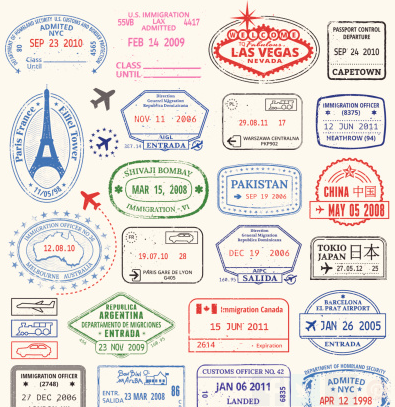An article I read recently in The New Yorker criticized the Ammon Bundy-led militia standoff at Malheur National Wildlife Refuge for being behind the times. Bundy and a host of other Westerners made a claim to federal lands, hoping the lands could be logged, mined and ranched. Yet, as the article says, this is a “completely outdated vision of the Western economy. In its view, land is valuable primarily because of what you can take out of it — minerals, oil and gas, timber, food.” Instead, lands are already and increasingly valuable as a commodity for tourism and recreation. If this is true, and there’s a fair bit of evidence that it is, I wonder how negative an impact visa restrictions have on international travel and tourism. Like Ammon Bundy’s reclamation movement, visa restrictions are outdated.
In Britain, tourists are often required to fill out stacks of forms with biometric registration information, including as much as a recent pay stub or verification from an employer explaining the nature and length of a business trip. Chinese visitors in particular are hit with arduous requirements before ever stepping foot on a plane. An article from The Economist mentions that only 18 percent of Chinese tourists make it to Britain, whereas nearly two-thirds make it to France and pay, on average, $2,500 per visit. Some estimates say British visa policies cost the country more than $3 billion annually.
Around the globe visitors are often expected to pay visa fees before entering a country. If you’re from the United States, for example, you’ll have to pay a $160 fee to visit Brazil. Bhutan “levies a $250 daily tariff on visitors in an apparent effort to discourage hordes from spoiling its pristine scenery,” according to The Economist. While pragmatic, these restrictions have adverse effects. By making fees high and requiring visitors to fill out long, arduous and even pointless forms before traveling, not only is “tourism” damaged as a commodity, but low-cost travel for the less wealthy becomes impossible.
If that were all, the problem would be somewhat manageable, but visa restrictions often target large groups of people in an effort to promote safety. In the last week, the Obama administration has, according to an article in The Guardian, “tightened travel terms regarding Iran, Iraq, Syria and Sudan, under rules that will also make travel to the U.S. harder for some Europeans.” This new provision targets dual nationals of those countries and anyone who has visited those countries in the last five years. This means that for anyone living, even temporarily, in those Middle Eastern countries, obtaining permission to re-enter the U.S. will be more difficult. This not only reduces one’s ability to travel to these places, it places an arcane, often incorrect stigma on those associated with those countries.
Visa restrictions seem to be a necessary burden of travel, because they aim to maintain national security and borders. But I don’t think this is the case. Visa restrictions deter legitimate tourists and hamper diplomatic ties. U.S.-Iranian diplomacy has strengthened in the last few years, but after the Obama Administration’s new policies are enacted, Iranians and dual-national Iranians will be among the people least likely to enjoy a visit to the U.S. In some cases, this policy protects us from terror organizations. Terrorism seems equally likely on American soil coming from American citizens, however, if these last few years are to be taken as an example. I can’t help but think that some policies, like those in Britain requiring Chinese visitors to go through bureaucratic tape, should enter the new millennium and allow for freer travel.
The U.S. is one of the most fortunate countries in that American citizens can travel to close to the largest number of countries (166) without needing visa permission or paying any extra fees. Tourists from China, however, “currently enjoy visa-free travel to only 41 countries,” according to The Economist. Travel to the U.S. is, especially for non-Europeans, a challenge in and of itself. Though unlikely, the Cato Institute predicts that “eliminating all travel visas to the United States would add between $90 billion and $123 billion in annual tourist spending.” Keeping in mind the benefits of peace, solidarity and diplomacy, lightening visa restrictions will only aid the world in this not-yet-universal aim.
To many around the globe, navigating visa restrictions is inherently limited to the wealthy and time-rich. I, for one, think this should not be the case (and not just because I want to visit Bhutan without paying an exorbitant daily fee). Rather, like that article criticizing Ammon Bundy for being behind the times, travel restrictions are antiquated. Travel is technologically easier than ever. It’s time to bring our policies in line.


